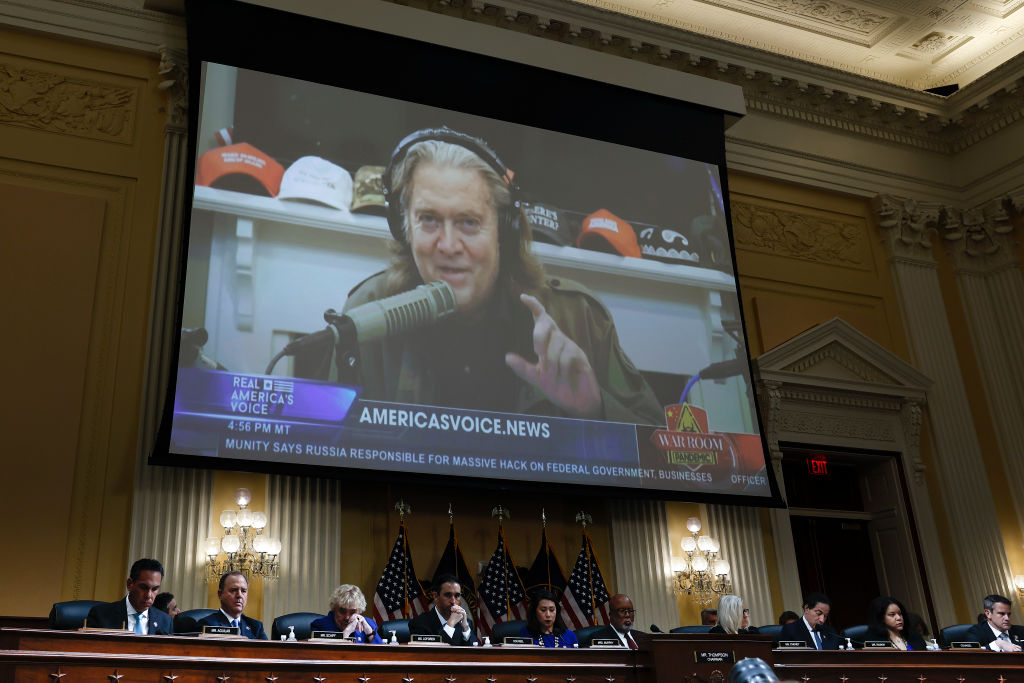Steve Bannon faces up to a year in prison as contempt of Congress trial begins


A free daily email with the biggest news stories of the day – and the best features from TheWeek.com
You are now subscribed
Your newsletter sign-up was successful
Jury selection began in the contempt of Congress trial of Steve Bannon, the former Breitbart News chair who served in former President Donald Trump's White House in 2017.
Bannon was charged with contempt after defying a subpoena issued last year by the Jan. 6 committee. The committee claimed that Bannon, who spoke to Trump twice on Jan. 5, appears to have had "some foreknowledge about extreme events that would occur the next day." Both contempt charges carry a maximum sentence of one year in prison.
The trial is unlikely to go well for Bannon. At a recent hearing, one of his lawyers asked U.S. District Judge Carl Nichols, "What's the point of going to trial if we don't have any defenses?" Nichols, a Trump appointee, simply responded, "Agreed."
The Week
Escape your echo chamber. Get the facts behind the news, plus analysis from multiple perspectives.

Sign up for The Week's Free Newsletters
From our morning news briefing to a weekly Good News Newsletter, get the best of The Week delivered directly to your inbox.
From our morning news briefing to a weekly Good News Newsletter, get the best of The Week delivered directly to your inbox.
According to The Guardian, Nichols ruled that Bannon cannot argue "that he had been relying on the advice of his lawyer when he defied the subpoena" and his claim of executive privilege is pretty shaky as well, considering that Bannon wasn't employed by the government at the time of the events in question.
Last week, Bannon offered to testify before the Jan. 6 committee after Trump affirmed he'd waive executive privilege. Nichols has not yet decided whether Bannon can use that offer as evidence in his defense.
With very few arguments in his quiver, Bannon is probably expecting to be found guilty and is only going through with the trial in order to preserve his ability to appeal, former federal prosecutor Jeffrey Bellin told Insider.
A free daily email with the biggest news stories of the day – and the best features from TheWeek.com
Grayson Quay was the weekend editor at TheWeek.com. His writing has also been published in National Review, the Pittsburgh Post-Gazette, Modern Age, The American Conservative, The Spectator World, and other outlets. Grayson earned his M.A. from Georgetown University in 2019.
-
 How Democrats are turning DOJ lemons into partisan lemonade
How Democrats are turning DOJ lemons into partisan lemonadeTODAY’S BIG QUESTION As the Trump administration continues to try — and fail — at indicting its political enemies, Democratic lawmakers have begun seizing the moment for themselves
-
 ICE’s new targets post-Minnesota retreat
ICE’s new targets post-Minnesota retreatIn the Spotlight Several cities are reportedly on ICE’s list for immigration crackdowns
-
 ‘Those rights don’t exist to protect criminals’
‘Those rights don’t exist to protect criminals’Instant Opinion Opinion, comment and editorials of the day
-
 Judge blocks Hegseth from punishing Kelly over video
Judge blocks Hegseth from punishing Kelly over videoSpeed Read Defense Secretary Pete Hegseth pushed for the senator to be demoted over a video in which he reminds military officials they should refuse illegal orders
-
 Trump’s EPA kills legal basis for federal climate policy
Trump’s EPA kills legal basis for federal climate policySpeed Read The government’s authority to regulate several planet-warming pollutants has been repealed
-
 House votes to end Trump’s Canada tariffs
House votes to end Trump’s Canada tariffsSpeed Read Six Republicans joined with Democrats to repeal the president’s tariffs
-
 Bondi, Democrats clash over Epstein in hearing
Bondi, Democrats clash over Epstein in hearingSpeed Read Attorney General Pam Bondi ignored survivors of convicted sex offender Jeffrey Epstein and demanded that Democrats apologize to Trump
-
 El Paso airspace closure tied to FAA-Pentagon standoff
El Paso airspace closure tied to FAA-Pentagon standoffSpeed Read The closure in the Texas border city stemmed from disagreements between the Federal Aviation Administration and Pentagon officials over drone-related tests
-
 Judge blocks Trump suit for Michigan voter rolls
Judge blocks Trump suit for Michigan voter rollsSpeed Read A Trump-appointed federal judge rejected the administration’s demand for voters’ personal data
-
 US to send 200 troops to Nigeria to train army
US to send 200 troops to Nigeria to train armySpeed Read Trump has accused the West African government of failing to protect Christians from terrorist attacks
-
 Grand jury rejects charging 6 Democrats for ‘orders’ video
Grand jury rejects charging 6 Democrats for ‘orders’ videoSpeed Read The jury refused to indict Democratic lawmakers for a video in which they urged military members to resist illegal orders
